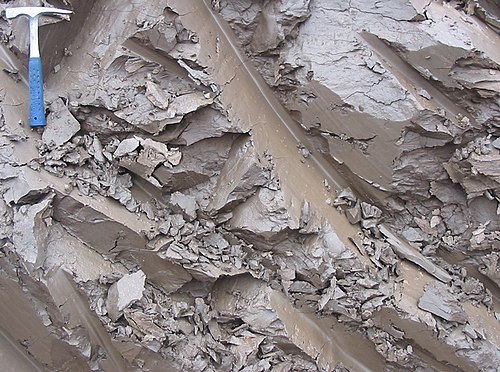Claynoun
A mineral substance made up of small crystals of silica and alumina, that is ductile when moist; the material of pre-fired ceramics.
Claynoun
An earth material with ductile qualities.
Claynoun
(tennis) A tennis court surface.
Claynoun
(biblical) The material of the human body.
Claynoun
(geology) A particle less than 3.9 microns in diameter, following the Wentworth scale.
Claynoun
A clay pipe for smoking tobacco.
Claynoun
A clay pigeon.
Claynoun
(informal) Land or territory of a country or other political region.
Clayverb
(transitive) To add clay to, to spread clay onto.
Clayverb
To purify using clay.
Claynoun
A soft earth, which is plastic, or may be molded with the hands, consisting of hydrous silicate of aluminium. It is the result of the wearing down and decomposition, in part, of rocks containing aluminous minerals, as granite. Lime, magnesia, oxide of iron, and other ingredients, are often present as impurities.
Claynoun
Earth in general, as representing the elementary particles of the human body; hence, the human body as formed from such particles.
Clayverb
To cover or manure with clay.
Clayverb
To clarify by filtering through clay, as sugar.
Claynoun
a very fine-grained soil that is plastic when moist but hard when fired
Claynoun
water soaked soil; soft wet earth
Claynoun
United States general who commanded United States forces in Europe from 1945 to 1949 and who oversaw the Berlin airlift (1897-1978)
Claynoun
United States politician responsible for the Missouri Compromise between free and slave states (1777-1852)
Claynoun
the dead body of a human being
Claynoun
a stiff, sticky fine-grained earth that can be moulded when wet, and is dried and baked to make bricks, pottery, and ceramics
Claynoun
sediment with particles smaller than silt, typically less than 0.002 mm.
Claynoun
a hardened clay surface for a tennis court
Claynoun
the substance of the human body
Claynoun
a European moth with yellowish-brown wings.
Clay
Clay is a type of fine-grained natural soil material containing clay minerals. Clays develop plasticity when wet, due to a molecular film of water surrounding the clay particles, but become hard, brittle and non–plastic upon drying or firing.
Slimenoun
Soft, moist earth or clay, having an adhesive quality; viscous mud; any substance of a dirty nature, that is moist, soft, and adhesive; bitumen; mud containing metallic ore, obtained in the preparatory dressing.
Slimenoun
Any mucilaginous substance; or a mucus-like substance which exudes from the bodies of certain animals, such as snails or slugs.
Slimenoun
A sneaky, unethical person; a slimeball.
Slimenoun
Human flesh, seen disparagingly; mere human form.
Slimenoun
(obsolete) Jew’s slime (bitumen)
Slimeverb
(transitive) To coat with slime.
Slimeverb
To besmirch or disparage.
Slimeverb
To carve (fish), removing the offal.
Slimenoun
Soft, moist earth or clay, having an adhesive quality; viscous mud.
Slimenoun
Any mucilaginous substance; any substance of a dirty nature, that is moist, soft, and adhesive.
Slimenoun
Bitumen.
Slimenoun
Mud containing metallic ore, obtained in the preparatory dressing.
Slimenoun
A mucuslike substance which exudes from the bodies of certain animals.
Slimeverb
To smear with slime.
Slimenoun
any thick messy substance
Slimeverb
cover or stain with slime;








